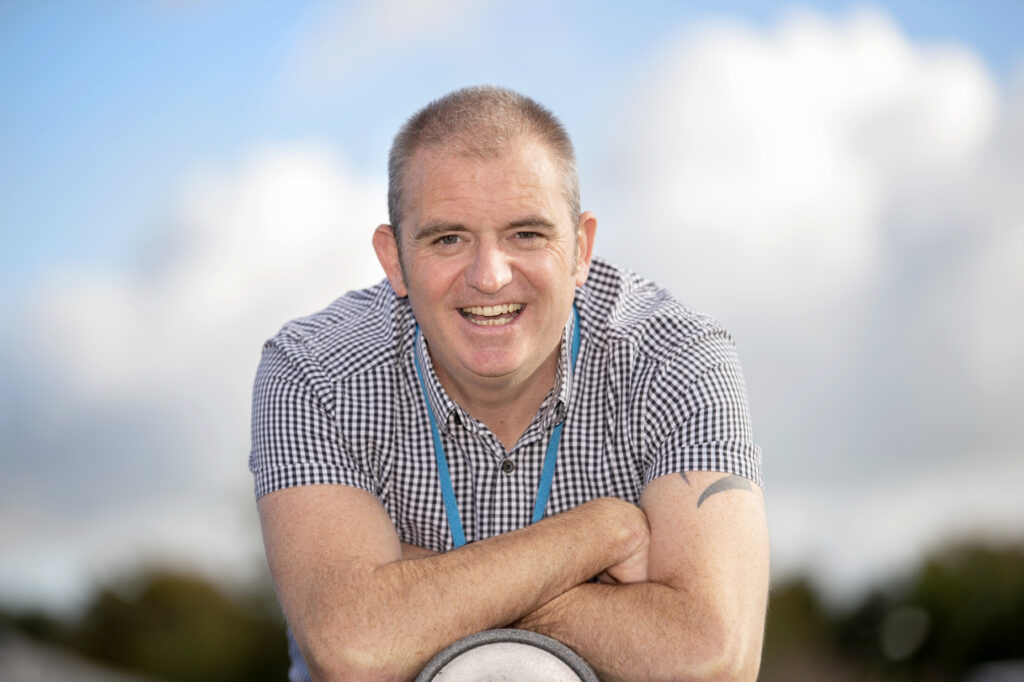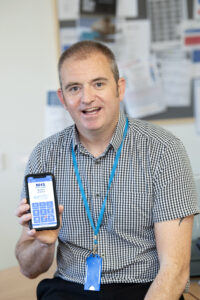James Hill
Advanced Nurse Practitioner within Addiction Services
NHS Ayrshire and Arran

My inspiration came from supporting and caring for my sister. My mum was the main carer, but I took her to see doctors, specialists and to her hospital appointments. Research says that people recover better at home. In a more relaxed environment, they are also more susceptible to accepting help – that’s where my passion for the community came from. The initial trust of being allowed to enter someone’s place gives you a good grounding to build a relationship but it’s not always simple. Working with addictions many of our clients are chaotic and vulnerable. Sometimes we have to question whether the environment is safe for the practitioner. You don’t know who else will be in the home you’re visiting or what circumstances you’ll be working in. But just as importantly we also need to know if the environment is safe for the client, there may be drug paraphernalia lying around or a lack of amenities. I think it’s so important to be able to assess risk in the places in which the people you care for spend the bulk of their time.

For my clients the biggest challenge they face is stigma. Addiction services and charities give people a voice. The general public often believes the negative stories they hear, and that unhelpful perception can be life-destroying for someone suffering substance abuse. There is an assumption that users don’t take care of themselves or aren’t capable, but often that’s not the case. Sometimes I even see poor management of symptoms that can exacerbate problem behaviours. I hope to help challenge the existing stigmas, particularly that addiction is an unsolvable problem. I want to promote the physical and mental wellbeing that comes from being drug free.
Drug deaths in Scotland are shockingly common and as a nurse, I am committed to reducing that number. I am here to help people find a level of normality they can cope with and encourage their hopes and aspirations. Nobody deserves death because they made a bad choice. Various clinics and needle exchanges share safe injecting protocols, and another wide range of psychosocial interventions are now available too. We all have an unhealthy coping mechanism to block out difficult issues, bad days or arguments, it is a strong temptation for everyone. But sometimes those coping mechanisms are dangerous and harmful. I see home pressed tablets made widely available as they turn a profit for dealers. When other factors like housing and finance impact health we must collaborate to tackle these. As nurses, these social determinants of health are our business and I work closely with housing and social services in an integrated team.
Part of my role is as a mental health nurse, and as an advanced nurse practitioner I also diagnose and prescribe. There are also elements of care, compassion and patience which I think come naturally to me and are critical to mental health nursing. Technically I need to have good clinical skills and knowledge but with a deeper understanding of the interactions that different medications have in different cases. When prescribing methadone in particular, safety is critical, you have to dose according to protocol even when patients might strongly persuade you otherwise. They think they can tolerate more because of the strength of the illegal drugs they’re already on but that’s not the case. It’s an interesting dynamic, building trust and relationships with patients but not letting them influence your clinical judgement as the professional in the room. Neurology is influenced by many factors, and I use my clinical assessment skills to identify any slight changes or behaviours. I would say that’s a real skill that can only be developed through experience and careful analysis.
I have significant autonomy as an advanced nurse practitioner in mental health and much responsibility, but so much potential to make a difference in someone’s life. Addiction treatment is all about timing and state of mind. If you can catch someone at the right time, the time when they want to change, then the benefits of an intervention can be metamorphic. Sometimes only a handful of people are at that stage where they want to make a change. Until they are ready, I try to help the clients take ownership of their own behaviours and decision making. We might look at the positive side of any events, if they have lapse in judgement, it might not be as bad as it was previously. Identifying a small blip versus someone going completely going off plan can help ease them back on track. Reassurance that the stages they go through are normal can make the difference in guiding someone towards recovery.
I’m naturally someone who likes to deal with things using humour, even if it’s a stressful situation. The Queen’s Nurse programme helped me to embrace this as just one of my leadership qualities. When managing one of the sub teams I learned to restrict my jokes. I wanted to reinforce their confidence in my judgements and the programme taught me how jokes can read as indecision or a lack of confidence when people don’t know me. I can be serious in situations that call for it and people will still understand that I’m approachable and that they can come to me for advice and support. On the selection day I loved it, the buzz of the short interviews and the genuine interest of the panel. I knew immediately I was going to embrace this in full. On the residential I would be the nurse with one eye open scanning the room during the mindfulness sessions but by the end of the week I felt at peace and rejuvenated. The facilitators have some kind of weird voodoo. They showed me that I have the answers already, I just have to reach for them.
COVID meant that many hostels were closed which led to multiple drug addicts at different stages of addiction or recovery instead being housed in the same blocks and streets. Those working hard to abstain were put in rooms with people still using and our own service moving to telephone consultations meant our awareness was dependent on what the clients wanted to share with us. It has completely changed the way we work as practitioners. We are unable to pick up on mannerisms, or the way someone is dressed over the phone, we can’t tell if they are eating. But in other ways, it‘s good for clients who have problems with their self-image or who don’t like to travel. Attendance rates have gone up via telephone consultations. A big thing that hit home for me was asking clients how their own lives have changed – many have said very little as they were isolated already. Now that vulnerable clients don’t have the same support mechanisms to keep them from being tempted it’s heartbreaking for us. If anything, I have more empathy since we’ve all felt the pressure of restricted living.
To keep us all going I’ve been sending morning pleasantries to the staff by email. I wish everyone a lovely day or remind them to keep smiling. I was surprised by the people who responded to me. Then when MS Teams took off, I was able to put in regular 10-minute coffee breaks with my team online. It was great to bring up challenging cases and tackle them together with just a bit of humor and kindness. I even made the team do the leadership dance on camera! Outside of work, running and the gym are what keep me sane. My gym coach started up a WhatsApp group to promote isolation workouts. He even distributed his equipment amongst the class for home use. At least for me, being able to rely on my community makes a real difference so I want to make sure I’m a part of that. I want to make sure I give back.
